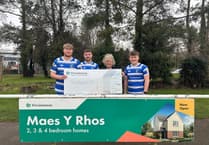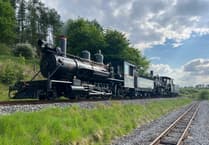The Welsh County LGBTQ+ Timeline Collection has been launched, documenting highlighted moments from history regarding LGBTQ+ rights and experiences. The research, constructed by Norena Shopland from her Welsh historic collection, looks at each county of Wales, including Powys.
The project complimented the Welsh Government Action Plan, aiming to tackle inequalities experienced by LGBTQ+ communities, challenge discrimination and create a society where LGBTQ+ people are safe to live and love authentically, openly and freely as themselves.
Speaking to The Brecon and Radnor Express, Norena said: “For two years I have been commissioned by the Culture Department of the Welsh Government to carry out training in LGBTQ+ Language and History for local libraries, museums and archives in Wales. The word local is important because the Culture Department wants more attention paid to local history for people to get involved in. There is a huge gap when it comes to Welsh histories of race, religion, sexual orientation, gender identity, disabilities, and indeed, women's histories. The Dictionary of Welsh Biography currently has only about 5% of biographies about women, this has a knock-on effect that diverse women are even less represented.”
Norena found that compiling this research was something that was faced with heritage sector challenges. “In this time of austerity, the heritage sector like others, is short of staff, volunteers, money and expert knowledge, and if those with diversities want their history represented they are having to do it for themselves.
“To increase the history of LGBTQ+ people, allies and events in Wales in our local heritage organisations, I decided to take all my vast research and put it into local timelines. These are open-access documents that can be added to, adapted and shared so that they become living documents that can be expanded over time.”
Norena’s research documented stories that might have been lost, including a Presteigne man who stood trial for trying to convince a Kington man to leave his wife and children and move to London with him. The story of Llandrindod Wells resident Olwen Bowen-Davies and her relationship with novelist Winifred Ashton is also highlighted.
Norena said: “The thing that continually surprises me when researching Welsh LGBTQ+ history is the enormous influence people from Wales have had, not just on Welsh and UK society, but worldwide. Many of the changes in laws were driven by those in Wales. The challenges included what to include and what to leave out. Some people did not like the inclusion of criminal histories for men, but they were retained to allow others to do more research on those individuals and their lives. Certain words were also objected to, but despite being considered offensive today they are historically accurate and to understand history we must understand all, even the bad bits. And of course, history is today and yesterday, not just the deep past.”
The timeline starts from the 18th century, and moves to the present day.
Now, Norena is hoping that people can continue to add to the timeline. “As we move forward, we can keep adding to the timelines and see the journey we and society have taken. They also serve as an aide-mémoire not to commit the same discriminations of the past for, as the philosopher George Santayana wrote in 1905, “Those who cannot remember the past are condemned to repeat it.””





Comments
This article has no comments yet. Be the first to leave a comment.